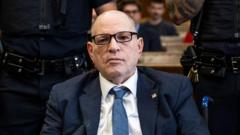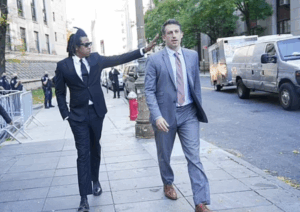In the retrial of Harvey Weinstein, prosecutors argue that the former producer exploited his Hollywood influence to sexually assault several women, while defense attorneys challenge the credibility of the accusers.
Weinstein's Retrial Examines Power Dynamics in Sexual Abuse Cases

Weinstein's Retrial Examines Power Dynamics in Sexual Abuse Cases
Harvey Weinstein faces renewed accusations in New York as allegations surface regarding his sexual misconduct with three women.
In a New York courtroom, Harvey Weinstein's retrial commenced on Wednesday, where opening statements underscored the disgraced film producer's alleged abuse of power over women in the entertainment industry. The Assistant District Attorney, Shannon Lucey, portrayed Weinstein as a man who wielded "unfettered power for over 30 years" to systematically molest and intimidate three women, including a former television production assistant, an aspiring actress, and a model.
Weinstein, who has maintained his innocence, is facing accusations stemming from a previous trial that was annulled by an appellate court last April. During this retrial, the allegations focus specifically on the accounts of two women from earlier reports—the actress Jessica Mann and the production assistant Miriam Haley—while also incorporating claims from Kaja Sokola, a Polish model assaulted at the age of 16.
In her opening hour, Lucey recounted harrowing stories of assault and harassment, revealing a pattern in which Weinstein would lure women to private locations under the false pretense of discussing business, only to force himself on them. Describing the resulting pain and shame endured by the victims, Lucey noted that many were silenced for years due to Weinstein's formidable stature in Hollywood.
Weinstein's defense attorney, Arthur Aidala, took a confrontational stance, suggesting the women sought relationships with Weinstein for personal gain rather than out of coercion. He argued that continued contact and seemingly friendly exchanges with Weinstein should negate the accusations against him.
Since a court of appeals overturned his prior conviction for sexual misconduct, Weinstein, 73, has been facing scrutiny not only for allegations in New York but also his earlier conviction in California for which he received a 16-year sentence.
In light of his medical conditions, including cancer and diabetes, Weinstein has been hospitalized, with an approval for him to remain at a secure hospital unit outside of court appearances. The former producer's legal troubles have far-reaching implications, having contributed to the cultural shift prompted by the #MeToo movement, which emboldened many victims to come forward with their experiences.
As the trial advances, both the prosecution and the defense prepare to present evidence that could once again reshape perceptions of power and accountability within the film industry. Amidst Weinstein’s ongoing legal battles, the magnitude of the allegations continues to resonate, highlighting the urgent need for systemic change in addressing sexual abuse by influential figures.





















